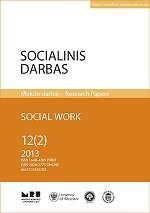Nuteistųjų vaikinų socialinių įgūdžių reikšmės subjektyvus vertinimas ir jų požiūris į socialinių įgūdžių ugdymą pataisos namuose
Subjective Evaluation of Young Male Convicts’ of Social Skills Importance and Their Attitude Towards Development of Social Skills in Correctional Faci
Author(s): Živilė Barkauskaitė-Lukšienė, Vida GudžinskienėSubject(s): Social Sciences
Published by: Mykolas Romeris University
Keywords: young male convicts; social skills
Summary/Abstract: The article analyses young male convicts’ subjective evaluation of their social skills and their attitude towards development of social skills in correctional facilities. The problem of the research was conditioned by the fact that adolescents in remand prisons and in correctional facilities lacked social skills. The majority of such young convicts come from single-parent or disharmonious families, where lack of social skills may be observed. Such families frequently lead asocial life; therefore, adolescents from such families weakly express intentions to lead a social life after completion of the sentence. Therefore, it was important to conduct the research on subjective evaluation of social skills possessed by adolescents servicing their sentence as well as on their attitude towards development of such skills in correctional facilities and, on the basis of the acquired research results, to enable the convicts to set up goals of positive life and to assist them in acquisition of social skills that the convicts lack. The research was conducted in Kaunas Remand Prison in January – March, 2012. The respondents received questionnaire forms and the goal of the research and instructions of filling in the questionnaire were explained and confidentiality was ensured. 120 questionnaire forms were handed out, 102 forms were returned and included into the research, striving for as reliable scientific research results as possible. The research showed that adolescents, who serviced their sentence in the correctional house, expressed a positive attitude towards development of social skills in correctional facilities. They were able to identify advantages of social skills possession and acknowledged that possession of social skills contributes to communication and establishment of relations. The respondents were also able to objectively evaluate themselves and others, constructively solve conflicts and make decisions. However, their evaluation of social skills as means to express feelings is low. It should be emphasised that the adolescents acquired the following skills and abilities in the correctional facility: communication, listening to others, better understanding of others, calm reaction to conflicts, doing housework and preparation of food. They understood and acknowledged that social skills helped them to agree with administration of the correctional facility as well as with peers. Almost half of the respondents pointed out that they violated rules in their correctional facility; while subjectively evaluating their own aggressiveness prior to their conviction and during servicing of sentence, more than half (59.8 %) acknowledged that they became less aggressive compared to the period before the correctional facility. Almost one fourth of the respondents pointed out that they became more aggressive, though they were perfectly aware of the social skills to be developed for aggressive adolescents. The research results showed that programmes implemented in
Journal: Socialinis darbas
- Issue Year: 12/2013
- Issue No: 2
- Page Range: 284-297
- Page Count: 14
- Language: Lithuanian

